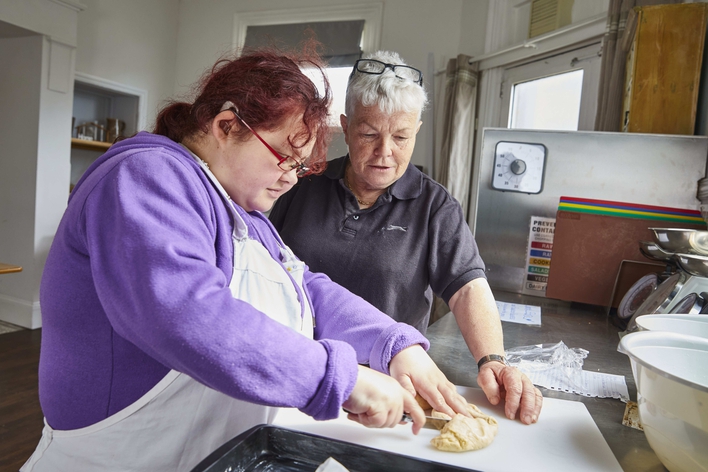Project lead Heather Sayer helps young people with learning disabilities learn how to make pottery, food and clothes, and sell the goods at local hub Willow Tree Stores.

“I got involved with Willow Tree because my daughter has a learning disability and there was nothing for her to do when she was a child. Care during the day costs around £170 and doesn’t help people like her to use their skills.
A lot of our members have untapped skills. One of our members is doing a degree in architecture and when we were first moving to the Willow Tree Stores, they worked on the plans for the building and learned a lot about reading blueprints, understanding ratios. All of this really helped them present well in the interview for their course.
One member Michael started coming because he was getting into a bit of trouble and could be hotheaded and frustrated when things weren’t accessible to him. Since he joined, he’s improved his maths and can identify what bus number he needs to get home or to get to where he needs to go. He’s learned to count money. We helped teach him to cook and now he wants to be a fitness instructor because he knows about nutrition and exercise.
We have a kiln and a pottery wheel where we teach members to make pot plants. We grow the plants too in the greenhouse, because people will give us cuttings of unusual plants and we propagate them. Members make pots for the plants they grow and we sell them in the stores. What members learn with us is so important for them to realise their potential and to feel more connected to the world.
People with a learning disability are often used as runners in county lines trafficking because the gangs know that they won’t be convicted. They’re vulnerable.
Heather Sayer
Project lead
We have a big county lines issue here [the transportation of drugs across county borders]. People with a learning disability are often used as runners because the gangs know that they won’t be convicted. They’re vulnerable. That’s a huge driving force behind our training and work making Gorleston High Street shops safe for everyone. Our guys are aware that if they enter a shop and they feel vulnerable because someone asks them to do something – and it can be as unassuming as ‘can you take this parcel to such-and-such and I’ll buy you a CD player?’ – they can approach someone from the shop who can provide help.
The worth of having these spaces is huge. It started out as having one safe space at Willow Tree Stores, but we now have lots of safe spaces.”
Subscribe
Join our email newsletter and stay up to date with our latest funding announcements and policy updates.
